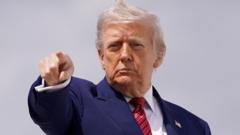**President Trump’s recent decision to delay proposed EU tariffs highlights ongoing trade disputes while aiming for a mutually beneficial agreement.**
**Trump Delays EU Tariff Increase Following Fruitful Discussions**

**Trump Delays EU Tariff Increase Following Fruitful Discussions**
**Negotiations Extended Amidst Trade Tensions with European Union**
In a surprising turn of events, US President Donald Trump announced an extension to negotiations regarding tariffs on European Union imports, pushing back the deadline to July 9. Originally, Trump had threatened to raise tariffs on EU goods to a staggering 50% by June 1, in response to what he deemed unfair trade practices. This threat followed a reduction of the initial tariff announcement from 20% to 10% to foster discussions with EU officials.
The decision to extend the deadline came after a productive conversation with Ursula von der Leyen, President of the European Commission, during which both leaders acknowledged the need for increased cooperation and a renewed commitment to finalizing a trade agreement. Von der Leyen confirmed her willingness to expedite the negotiation process, emphasizing that time until July 9 would be essential to reach a favorable outcome for both parties.
Despite ongoing tensions, the economic relationship between the US and the EU remains significant, with the EU being among America's largest trading partners. Systematic import tariffs, which Trump has defended as a strategy to bolster American manufacturing, have sparked fears of rising costs for consumers and disruptions in global trade markets. As it stands, certain tariffs, especially on steel and aluminum, remain enforced while discussions continue.
European leaders, including trade chief Maros Sefcovic, reaffirmed their commitment to securing a fair deal while urging for a diplomatically-driven resolution to avoid harmful repercussions on both economies. With both sides seemingly ready for talks, observers remain cautious about further escalations, aware of the potential global economic impact.
The decision to extend the deadline came after a productive conversation with Ursula von der Leyen, President of the European Commission, during which both leaders acknowledged the need for increased cooperation and a renewed commitment to finalizing a trade agreement. Von der Leyen confirmed her willingness to expedite the negotiation process, emphasizing that time until July 9 would be essential to reach a favorable outcome for both parties.
Despite ongoing tensions, the economic relationship between the US and the EU remains significant, with the EU being among America's largest trading partners. Systematic import tariffs, which Trump has defended as a strategy to bolster American manufacturing, have sparked fears of rising costs for consumers and disruptions in global trade markets. As it stands, certain tariffs, especially on steel and aluminum, remain enforced while discussions continue.
European leaders, including trade chief Maros Sefcovic, reaffirmed their commitment to securing a fair deal while urging for a diplomatically-driven resolution to avoid harmful repercussions on both economies. With both sides seemingly ready for talks, observers remain cautious about further escalations, aware of the potential global economic impact.





















